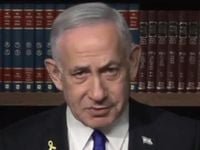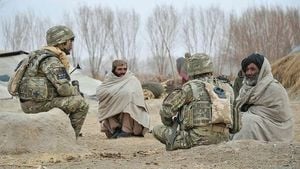The diplomatic relationship between Israel and Australia has reached a new low, with Israeli Prime Minister Benjamin Netanyahu launching a series of scathing personal attacks on his Australian counterpart, Anthony Albanese. The latest escalation came during a fiery 16-minute interview aired on Sky News Australia on August 21, 2025, in which Netanyahu accused Albanese of emboldening Hamas, fueling anti-Semitism, and permanently tarnishing his own political legacy.
Netanyahu’s comments come in response to Australia’s recent decision—announced by Albanese’s centre-left Labor government—to conditionally recognize Palestinian statehood. This move, which places Australia alongside countries like France, Britain, and Canada in supporting Palestinian recognition at the United Nations, has been met with fierce criticism from Israel. Netanyahu, clearly incensed, declared, “I’m sure he has a reputable record as a public servant, but I think his record is forever tarnished by the weakness that he showed in the face of these Hamas terrorist monsters.” According to Sky News Australia, the Israeli leader went further, describing Albanese as “a weak politician who betrayed Israel and abandoned Australia’s Jews.”
Netanyahu did not mince words in outlining his concerns. He accused the Australian government of rewarding terrorism by supporting Palestinian statehood, stating, “So when Prime Minister Albanese ... says ‘Oh we’ll give them a Palestinian state,’ they’re actually rewarding terror.” He likened the move to the appeasement of Hitler prior to World War II, warning, “It’s appeasement. Pure and simple.” Drawing a historical parallel, he referenced the pressure on democracies to surrender the Sudetenland to Nazi Germany, only for war to break out shortly afterward. “The worst war in the history of humanity, that claimed millions and millions of people, innocent people dead. Well, we’re not gonna repeat that,” Netanyahu said.
The diplomatic spat quickly escalated into a tit-for-tat exchange. After Australia canceled the visa of Israeli MP Simcha Rothman over controversial remarks, Israel retaliated by revoking the visas of Australian diplomats to the Palestinian Authority. The Executive Council of Australian Jewry (ECAJ), Australia’s leading Jewish organization, intervened, urging both leaders to resolve their differences through diplomatic channels and measured language. In letters sent to both Netanyahu and Albanese, the ECAJ expressed “deep dismay and concern at the recent ‘war of words’,” emphasizing, “If things need to be said publicly, they should be said using measured and seemly language befitting national leaders. Australia and Israel are mature democracies, and their governments need to act accordingly.”
Albanese, for his part, sought to downplay the personal nature of Netanyahu’s attacks. Speaking to reporters on August 20, 2025, he remarked, “I don’t take these things personally … He has had similar things to say about other leaders.” Albanese also emphasized his commitment to respectful international relations, saying he treats other leaders with respect. However, his Home Affairs Minister Tony Burke took a firmer stance, retorting, “Strength is not measured by how many people you can blow up or how many children you can leave hungry.”
The broader context for this diplomatic clash is the ongoing conflict in Gaza. Israel’s military, as announced on August 20, 2025, has begun the first steps of an operation to take control of Gaza City, calling up tens of thousands of reservists. The offensive began after Hamas-led militants stormed into southern Israel in October 2023, killing 1,200 people and taking 251 hostages. According to the Gaza health ministry, Israel’s subsequent military campaign has killed at least 60,000 Palestinians and displaced most of the population. International pressure has mounted on Israel to allow unrestricted humanitarian aid into Gaza, with the United Nations warning of the risk of widespread starvation.
Netanyahu, however, vehemently denied accusations that Israel is starving civilians or committing genocide. He insisted, “Israel is starving Palestinian children? What lies? I mean, we brought in two million tons of food into Gaza since the beginning of the war. Hamas has been stealing this food and selling the remainder at exorbitant price.” He also highlighted Israel’s efforts to warn civilians ahead of military strikes, claiming, “Israel is doing what no other army has done … the lengths that we go to protect the civilian population has been unheard of, yet Israel is being vilified, just as in the Middle Ages.” Netanyahu asserted that Israel had sent “millions and millions of text messages” urging Palestinians to evacuate areas where Hamas was embedded, but alleged that Hamas prevented many from escaping by shooting those who tried to flee.
In the interview, Netanyahu drew stark warnings for Western democracies, including Australia, stating, “The Western leaders, including unfortunately in Australia, are … trying to feed the crocodile of militant Islam … The more you pour fuel into this anti-Semitic, anti-Israel and anti-Western fire, the greater the fire will grow, it will consume you in the end.” He condemned violent pro-Palestinian rallies in Sydney and Melbourne, urging governments to “defy” extremist slogans rather than yield to them.
Netanyahu also revealed that former US President Donald Trump supports Israel’s stance, saying, “I think President Trump put it best, he says Hamas has to disappear from Gaza.” Trump, according to Netanyahu, viewed Australia’s position on Palestinian statehood as “irrelevant” and fully supported Israel’s goal of eliminating Hamas’ last stronghold in Gaza City.
The situation has been further complicated by a surge in anti-Semitic incidents in Australia, including the burning of a Melbourne synagogue. Netanyahu expressed his dismay, saying, “I’ve seen this tsunami of anti-Semitism, this racism, and this targeting of the innocents … these are horrible things, and you know, if you don’t stop them when they’re small, they get bigger and bigger and bigger and ultimately they consume your society.” The ECAJ, in its letters, warned that the leaders’ escalating rhetoric was placing the Jewish community in a vulnerable position, stating, “The Australian Jewish community will not be left to deal with the fallout of a spat between two leaders who are playing to their respective domestic audiences.”
Despite the heated exchanges, Netanyahu struck a note of resolve and defiance, assuring Australians, “I want to assure Australians that we will win. They may get away with pushing these lies against us, but we do not succumb on the battlefield. We roll back those who would exterminate us … and we’ll secure the peace.” He added, “It’s to free Gaza, free them from Hamas tyranny, free Israel and others from Hamas terrorism, give Gaza and Israel a different future, and I think we’re close to doing it.”
As Israel considers a new ceasefire proposal and the international community watches closely, the diplomatic rift between Jerusalem and Canberra remains a stark reminder of how the Gaza conflict continues to reverberate far beyond the Middle East, challenging alliances and straining even the most established of partnerships.




